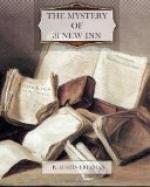“Well?” Thorndyke said presently, after watching with grave interest my unavailing efforts; “what do you make of it?”
“Nothing!” I exclaimed desperately, slapping the paper down on the table. “Of course, I can see that there are some queer coincidences. But how do they bear on the case? I understand that you want to upset this will; which we know to have been signed without compulsion or even suggestion in the presence of two respectable men, who have sworn to the identity of the document. That is your object, I believe?”
“Certainly it is.”
“Then I am hanged if I see how you are going to do it. Not, I should say, by offering a group of vague coincidences that would muddle any brain but your own.”
Thorndyke chuckled softly but pursued the subject no farther.
“Put that paper in your file with your other notes,” he said, “and think it over at your leisure. And now I want a little help from you. Have you a good memory for faces?”
“Fairly good, I think. Why?”
“Because I have a photograph of a man whom I think you may have met. Just look at it and tell me if you remember the face.”
He drew a cabinet size photograph from an envelope that had come by the morning’s post and handed it to me.
“I have certainly seen this face somewhere,” said I, taking the portrait over to the window to examine it more thoroughly, “but I can’t, at the moment, remember where.”
“Try,” said Thorndyke. “If you have seen the face before, you should be able to recall the person.”
I looked intently at the photograph, and the more I looked, the more familiar did the face appear. Suddenly the identity of the man flashed into my mind and I exclaimed in astonishment:
“It can’t be that poor creature at Kennington, Mr. Graves?”
“I think it can,” replied Thorndyke, “and I think it is. But could you swear to the identity in a court of law?”
“It is my firm conviction that the photograph is that of Mr. Graves. I would swear to that.”
“No man ought to swear to more,” said Thorndyke. “Identification is always a matter of opinion or belief. The man who will swear unconditionally to identity from memory only is a man whose evidence should be discredited. I think your sworn testimony would be sufficient.”
It is needless to say that the production of this photograph filled me with amazement and curiosity as to how Thorndyke had obtained it. But, as he replaced it impassively in its envelope without volunteering any explanation, I felt that I could not question him directly. Nevertheless, I ventured to approach the subject in an indirect manner.
“Did you get any information from those Darmstadt people?” I asked.
“Schnitzler? Yes. I learned, through the medium of an official acquaintance, that Dr. H. Weiss was a stranger to them; that they knew nothing about him excepting that he had ordered from them, and been supplied with, a hundred grammes of pure hydrochlorate of morphine.”




